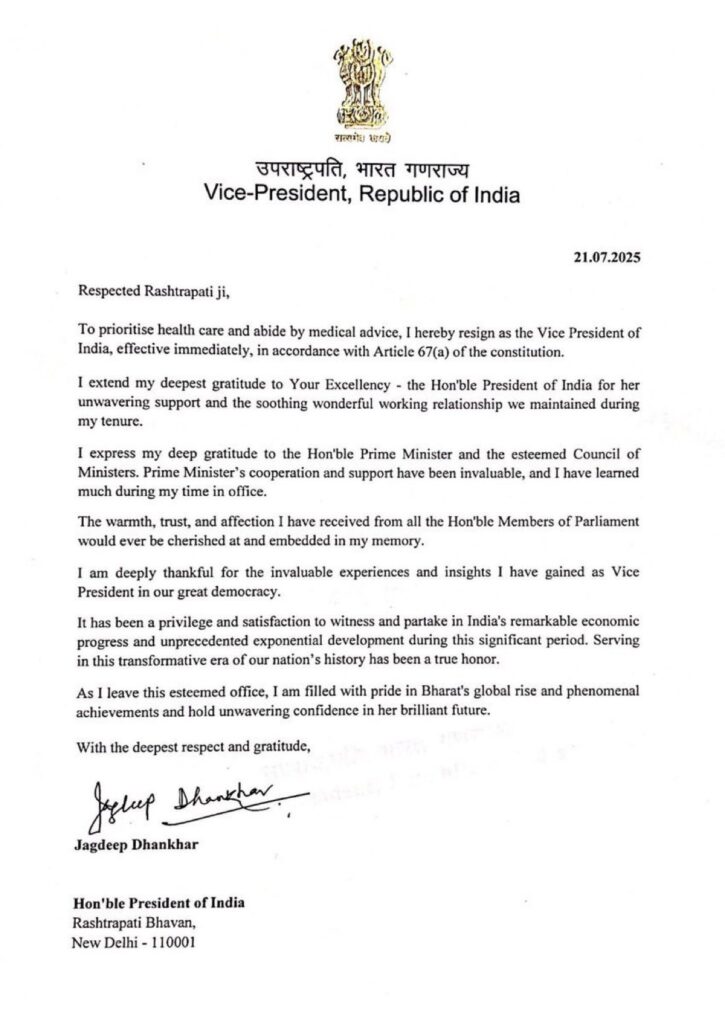Vice President of India, Jagdeep Dhankhar, has submitted his resignation, citing health reasons, a move officially accepted by the President. While the announcement was sudden, it has immediately sparked a flurry of unofficial theories and analyses regarding the true circumstances behind his departure, moving beyond the stated health concerns.

The swiftness of the resignation and the immediate transition have led many to question the official narrative. Observers quickly noted the perceived “cold and dry” nature of Prime Minister Narendra Modi’s farewell tweet to Mr. Dhankhar, which wished him “good health” after he had “got many opportunities to serve our country.” This brief message was interpreted by some as lacking warmth, hinting at underlying tensions between the Vice President and the government.
Shri Jagdeep Dhankhar Ji has got many opportunities to serve our country in various capacities, including as the Vice President of India. Wishing him good health.
— Narendra Modi (@narendramodi) July 22, 2025
श्री जगदीप धनखड़ जी को भारत के उपराष्ट्रपति सहित कई भूमिकाओं में देश की सेवा करने का अवसर मिला है। मैं उनके उत्तम…
What events led to the resignation?
Several factors may have contributed to Dhankhar’s resignation:
- He hosted a party funded by government resources prior to his resignation, raising questions.
- His alignment with opposition parties, particularly on impeachment motions against Justices Verma and Yadav, reportedly angered the ruling government.
- Frequent meetings with senior Congress leaders were perceived as threats to government solidarity.
How did the resignation unfold during the parliamentary session?
Dhankhar’s resignation during an ongoing parliamentary session is seen as serious and indicative of instability within the government. Media reports suggest internal disagreements, particularly a fallout with the Home Minister over the impeachment proposal, contributed to the decision.
What was the political response to his resignation?
In the Rajya Sabha, BJP President JP Nadda’s remarks about the appropriateness of Mallikarjun Kharge’s uninterrupted speech further escalated tensions. Political speculation emerged that Nadda was instructed by the Home Minister to confront Dhankhar regarding his actions.
How did Jagdeep Dhankhar’s political background play a role in the situation?
Dhankhar has a diverse political background, having been associated with Janata Dal, Congress, and the BJP. His rise within BJP culminated in his appointment as Vice President, which was seen as a reward for his loyalty. This multi-party affiliation raises questions about his political allegiance and stability.
Were there specific theories suggested regarding the reasons for his resignation?
Multiple theories surfaced:
- Leadership Discontent: Modi’s decisive leadership style suggests he would not tolerate dissent from within, prompting Dhankhar’s ousting.
- RSS Influence: Reports indicate dissatisfaction from the RSS with Dhankhar’s performance, suggesting they played a role in prompting this resignation.
What implications does Dhankhar’s resignation have for the government?
The resignation signals potential turmoil and leaves the government open to intense scrutiny and speculation about its internal dynamics. The accusations that Dhankhar faced could harm the government’s reputation, especially if further issues come to light regarding its management of parliamentary affairs.
What key speeches and statements have been made by Dhankhar?
Dhankhar made public statements challenging the government’s policies on agriculture, addressing the plight of farmers, and taking the Agriculture Minister to task, which may have been perceived as a direct threat to the government at a critical juncture.
How did Dhankhar’s actions reflect on his relationships within the government?
His open criticisms and meetings with the opposition could be interpreted as acts of defiance against the government, suggesting he may have been positioning himself for a different political pathway, making him uncomfortable within the BJP and RSS framework.
What theories exist regarding the motivations behind Dhankhar’s resignation?
Observers speculate that Dhankhar’s resignation stemmed from a realization of being taken for granted within a party he served loyally. Furthermore, at 74, he may have started to reflect on his legacy, leading him to question his role and obligations as a constitutional head.
Are there historical parallels that could provide insight into Dhankhar’s situation?
Historical examples include former President Giani Zail Singh and former Speaker Somnath Chatterjee, both of whom stood up against their political parties after feeling marginalized. These cases illustrate a potential awakening of self-respect and the importance of constitutional duties over party loyalty.
What broader implications does Dhankhar’s resignation have for political dynamics in India?
Dhankhar’s resignation highlights the delicate balance between loyalty to political parties and adherence to constitutional responsibilities. It raises questions about the handling of dissent within political ranks and suggests the potential for similar situations in the future as individual conscience asserts itself against party expectations.
This situation highlights unraveled tensions within the governing coalition and gives rise to significant concern over cohesiveness at the upper echelons of Indian politics during a crucial session.
Also Read:
